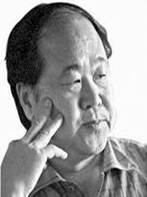题目内容
B. 1990's; his sixty
C. the 1990s; his sixties
D. the 1990's; sixty

Recently,CCTV reporter have asked a simple question, “Are you happy?”
The question has caught many interviewees off guard. Even Mo Yan, who recently won a Nobel Prize, answered by saying “I don’t know.”
We should ask “What exactly is happiness? And how do you measure(测量) it?”. Last year, China’s Premier Wen Jiabao told the nation, “Everything we do is aimed at letting people live more happily.” At last year’s National People’s Congress(全国人民代表大会), officials agreed that increasing happiness would be a top target(目标) for the 12th five-year plan.
Many argue that happiness is elusive. It also means different things to different people. For some, happiness can be as simple as having enough money to buy a new bicycle; for others, it’s about socializing(社交活动) or finding the perfect spouse(配偶).
Chen Shangyuan, 21, a college student, said his idea of happiness always evolves(进化). “At present it relates to how productive I am in a day”, he said. “It might be linked to(联系) job security (安全) or leisure(休闲) time after I graduate.”
【小题1】What did Mo Yan say when he was asked the question “Are you happy?”
| A.Yes, I am very happy. | B.No, I am not happy. |
| C.It depends on the weather. | D.I don’t know |
| A.Economic | B.Peace | C.Culture | D.Increasing happiness |
| A.难以理解 | B.难能可贵 | C.难以实现 | D.难以忘记 |
A big house. B. An expensive car. C. Money D. Job security or leisure time.
【小题5】Form this passage, we can know that_________.
| A.happiness can be measured |
| B.to be happy is very |
| C.different people have different ideas about happiness |
| D.If we have a lot of money we will feel happy |

Mo was born into a farming family in a village in Shandong province .He grew up listening to folk stories about gods, spirits foxes .Those stories later became the inspiration (灵感)for Mo’s writing.
Mo left school at the age of 12 and started to work in the fields . Although he was tired after his daily hard work ,Mo was always hungry for books .However, there were very few in the village .He read his older brothers’ textbooks and even dictionaries .He helped others with farm work in exchange for books . “When I finished reading all the books around ,I thought I was the most knowledge man in the world ,”he told Xinhua.
After Mo left his hometown and joined the army in 1976,he began to read widely ,including works by Lu Xun and many other famous writers .He studied from these writers but did not copy them .Instead ,he developed his own style .As the first Chinese citizen(公民)to win a Nobel Prize in literature, Mo told a group of reporters in his hometown shortly after he won the award . “I grew up in an environment filled with folk culture .It enters my novels whenever I pick up a pen This has affected ,even decided my style.”
【小题1】When did Mo Yan leave school and start to work in the fields ?
| A.at the age of 12. | B.at the age of 11. |
| C.at the age of 13 | D.at the age of 15 |
| A.Shanxi | B.Jiangsu | C.Shandong | D.Guangdong |
| A.while listening to folk stories about gods ,spirits and foxes |
| B.during his dairy hard work in the fields. |
| C.when he won the Nobel Prize in literature. |
| D.after he studied from many famous writers. |
| A.Mo Yan left school when he was very young. |
| B.Mo Yan was the most knowledgeable man in the world. |
| C.Mo Yan read many books when he was very young. |
| D.Mo Yan is the first Chinese citizen to win a Nobel Prize in literature. |
| A.Rome was not built in a day. | B.Easier said than done. |
| C.Well begun , half done . | D.The older, the wiser. |
 our
dream will come true in the end.
our
dream will come true in the end. tell
stories.
tell
stories.